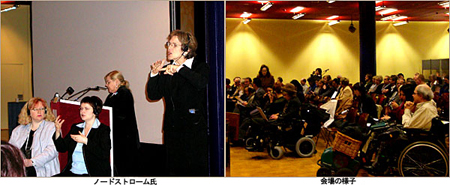国連世界情報社会サミット報告会
参考資料
グローバル・フォーラム―情報社会における障害者
ハイライト(2003年12月12日)
DINFのURL http://www.dinf.ne.jp
グローバル・フォーラム「情報社会における障害者」は2003年12月12日の午前9時30分から午後6時30分まで開催され、成功のうちに幕を閉じた。プログラムは様々な障害に対応し、印刷版、拡大印刷版、点字版、CD-ROMなどが用意され、またウェブ上でも提供された。フォーラムのあいだは手話通訳も行なわれた。参加者は、様々な障害のある人を含め約200人であった。
フォーラムは、オープニング・セッション、成功を収めた事例の紹介、全ての人のためのICT(情報通信技術)の設計と開発、クロージング・セッションと4つのセッションに分けられていた。
フォーラムは組織委員会を代表し、スイス視覚障害者図書館理事のバーナード・ハインザー氏の歓迎の辞により始まった。同氏の団体の好意で、原則宣言の草案、行動計画案などWSISの資料がDAISYフォーマットのCD-ROMで全てのWSISの参加者に配布された。
世界盲人連合(WBU)の会長であり、国際障害同盟の会長でもあるキキ・ノードストローム氏はオープニング・セッションで市民社会を代表し、基調講演を行なった。スピーカーのほとんどは障害当事者であり、そのことは情報社会におけるICTについて彼らの声を届けることができたということにおいて、非常に重要な意味を持つことになった。
(プロフィールと講演の要約は以下のURLに掲載。)
http://www.dinf.ne.jp/doc/english/prompt/031215_3wsis.html
クロージング・セッションでは、河村宏氏が議長を努めるディスカッションの後、「アクセシブルな情報社会に関するジュネーブ宣言」がグローバル・フォーラムによって採択された。河村氏は市民社会局の障害者グループの中心的役割を果たしてきた。宣言は以下である。
アクセシブルな情報社会に関するジュネーブ宣言
- 我々は情報社会が21世紀とそれに続く未来にわたり、文明の方向性と発展性を決定することを認識し、
- 情報社会に対し確固たる信念を持ち、情報及びコミュニケーションへのアクセスは基本的人権であると明言し、
- 障害者、特に発展途上国における障害者は最貧困層であり、情報及びコミュニケーション技術から孤立し、新しい先端のICTの恩恵を受けられずにいることに留意し、
- 点字、手話、触手話、地域の言語による読みやすい資料、文書ではないシンボル・システムやその他の支援機器が障害者の情報及びコミュニケーションに欠かせないことを認識し、
- オープンソース・ソフトウェア及びハードウェアの開発など、情報社会の包括性と持続性の決定に役立つ重要な問題に対し、政府や民間企業から充分な関心と支援を得られていないことを懸念し、
- 障害者のニーズと要求がWSISの文書で見られたように、政府、市民社会から認知し始められたことを評価し、
- しかしながら、ジュネーブでのサミットにおいては、サミットの情報が代替フォーマットで開催に間に合うよう提供されなかったり、点字プリンター、合成音声、手話通訳などのサービスの不足、また6億人以上の障害者の問題を適切に取り組む内容が欠落していたりと、障害者のニーズを完全に満たしてはいなかったことに遺憾をもって留意し、
- ICT開発のプロセスを通し、消費者、パートナー、貢献者としての障害者の活発な参加が、包括的な情報社会の形成に重要であることを認識し、我々は、世界情報社会サミットにおいて開催されたグローバル・フォーラム「情報社会における障害者」の参加者として、団結して以下のことを宣言する。
- 障害者はいかなる障壁、偏見、差別からも解放され、情報社会のあらゆる側面において完全参加の権利を持つ。
- 各政府の法律及び政策は、障害者のニーズと権利を満たすフォーマットで情報、コミュニケーション及びICTへアクセスできるという基本的人権を保障しなければならない。
- 情報、コミュニケーション及びICTの内容は情報社会を形成するのに重大な役割を果たすので、政府、企業、市民社会はユニバーサルデザイン、支援技術及び拡大技術を活用し、あらゆるタイプの障害を持つ人にアクセシブルにしなければならない。
- ICTを通して得られる情報や知識は、障害を持たない人と同時に、また追加の費用を負担することなく、障害者に提供されなければならない。
- 知的所有権保護、著作権法及びデジタル権利管理(DRM)システムを含む、いかなる社会的な基準、規則、法律/政策も障害者の情報及びコミュニケーションへのアクセスを危うくするものであってはならない。
- 情報社会は、障害者にとってユニバーサルで、オープンで、独占的ではなく、アクセシビリティが証明された実績をもつ、すなわちプラットフォームに依存しない、情報、コミュニケーション及びICTスタンダードを採用し、それに従うべきである。
- 21世紀の目標である貧困の緩和に一致し、情報社会において財源が不足している人々のインクルージョンに帰するイニシアチブを開始しなくてはならない。
- 支援技術、文書、トレーニング、技術的支援が、地域の言語で分かりやすい形で、提供されなくてはならない。
- 年齢、性別、原住民、地理的孤立、経済的障壁、教育が受けられないこと、障害に対する偏見などによる多くの障壁に配慮しなくてはならない。
- チュニスで開催される第2回WSISの準備として、主催者は障害者とその団体を参加させなくてはならない。
- プログラムと内容は世界中の6億人以上の障害者のニーズを反映させるべきで、手話、点字及び代替フォーマットなど障害者のコミュニケーションのニーズを考慮し提供しなければならない。
- ジュネーブからチュニスまで全てのWSISのプロセスにおいて、障害者の完全参加のために、あらゆるコミュニケーションの障壁に取り組み、また取り除くべきサービス、すなわち代替フォーマットの資料が得られるリソース・センター、アクセシブルなインプット及びアウトプットができるコンピューター、合成音声、アクセシブルなキーボード、点字プリンター、手話通訳者、その他のリソースなどが得られるようにする必要がある。
サミットの成果
今回のサミットでは原則宣言と行動計画が採択されました
原則宣言草案(仮訳)
http://www.dinf.ne.jp/doc/japanese/prompt/031217wsis.html
行動計画(仮訳)
http://www.dinf.ne.jp/doc/japanese/prompt/031217_2wsis.html
市民社会宣言(仮訳)
http://www.dinf.ne.jp/doc/japanese/prompt/031217_3wsis.html
Geneva Declaration on Accessible Information Society

Recognizing that the information society will determine the direction and development of human civilization throughout the 21st century and beyond;
Stating, with firm belief in the Information Society, that access to information and communications is a fundamental human right;
Bearing in mind that persons with disabilities, especially those in developing countries, are the poorest of the poor, leading to isolation from information and communication and exclusion from the benefits of new and emerging ICTs;
Realizing the importance of existing tools such as Braille, sign languages, tactile sign languages, easy-to-read materials in local languages including those without written scripts, symbol systems and other assistive devices as vital for persons with disabilities to meet their information and communication needs,
Noting with concern that several key issues which can help determine the inclusiveness and sustainability of the information society, such as open source software and open hardware development, are not receiving enough commitment and support from governments and private sectors;
Noting with appreciation that the needs and requirements of persons with disabilities are beginning to be recognized by governments and civil society as shown in the WSIS documents;
But, noting with regret, that the summit in Geneva has not yet sufficiently taken the needs of persons with disabilities into account as demonstrated by the absence of timely summit information in alternate format, facilities such as Braille printers, synthetic speech, sign language interpreters and the absence of content that adequately addresses issues of more than 600 million persons with disabilities;
Realizing the importance of active involvement of persons with disabilities as consumers, partners, and contributors throughout the process of ICT development which will help shape the inclusive information society;
We, participants of the Global forum on Disability in the Information Society, held during the World Summit on the Information Society declare in solidarity that:
- Persons with disabilities have the right to full participation in all aspects of the information society, free from all types of barrier, prejudice and discrimination;
- Legislation and policies at all levels of government must ensure the fundamental human right of access to information, communication and ICTs for persons with disabilities in formats that meets their needs and their rights;
- As content of information, communications and ICTs play a crucial role in shaping the information society, Governments, Businesses, and Civil Society must make them accessible to persons with all types of disabilities, using Universal Design and assistive and augmentative technologies;
- Access to information and knowledge through ICTs must be available at the same time and at no additional cost for those with disabilities as compared to those without disabilities;
- Any social norms, rules, legislation/policies including intellectual property rights protection and copyright laws or Digital Rights Management (DRM) system must not compromise the fundamental right of access to information and communications for persons with disabilities;
- The information society should adopt and follow information, communications and ICT standards that are universal, open, non-proprietary, platform independent with a proven track record of accessibility for persons with disabilities;
- Consistent with the millennium goals for poverty alleviation, initiatives must be undertaken that result in the inclusion of people lacking resources in the information society;
- Assistive technologies, documentation, training, and technical support should be made available in easy to understand local languages for persons with disabilities;
- The information society must take into account many barriers associated with age, gender, indigenous peoples, geographic isolation, economic barriers, lack of access to education and social prejudice associated with disability;
- In preparation for the second WSIS in Tunis, the organizers should include persons with disabilities and their organizations in the preparation;
- Programs and content should reflect the needs of more than 600 million persons with disabilities in the world, and that deliberation should provide for communication needs of this population such as sign languages, Braille, alternate formats, etc;
- In all WSIS processes from Geneva through Tunis, facilities should be made available for the full participation of persons with disabilities, including resource centres with materials in alternate formats, computers with accessible input and output devices such as synthetic speech capacity, accessible keyboards, Braille printers, sign language interpreters and other resources to address and eliminate the variety of communication barriers;
